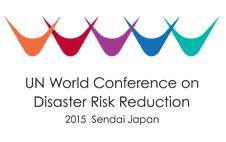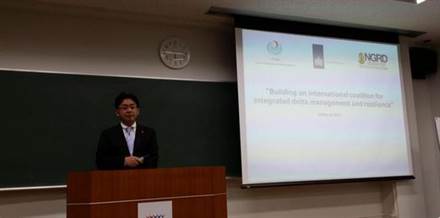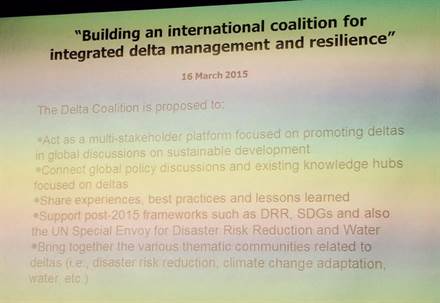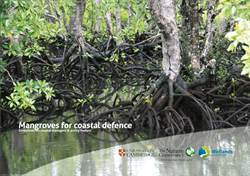
From WCDRR Sendai: Eco-DRR Report – Monday 16 March
-
Coastal resilience
-
Coastal wetland conservation
-
Integrated delta management
About 80% of the text for a post-2015 framework on Disaster Risk Reduction is agreed, we are making progress; The Netherlands, France, Philippines, Vietnam, Colombia and Japan explore the idea to form an Alliance of Delta countries for more cooperation between countries on prevention and reduction of water related disasters in deltas.

Providing daily news, blogs and updates on ecosystem solutions for reducing disaster risk at the World Conference on DRR, 14-18 March in Sendai, Japan. Our experts in Sendai are available for background and interviews. CONTACT: [email protected] and [email protected]. Phone: +31622624702. Follow us on Twitter @wetlandsint
————————————————————————————————————————————————–
What happened on Monday 16 March in Sendai:
Negotiations Post-2015 framework for DRR
By now 80% of the text for a post-2015 framework on Disaster Risk Reduction is agreed, so countries are making progress.
Eco-DRR events on Monday 16 March:
Today the Netherlands, Colombia and Japan co-hosted the event ‘Preventive action in water-related DRR’, moderated by Jane Madgwick, CEO of Wetlands International. In the event Minister Ploumen of Foreign Trade and Development of the Netherlands tested the idea to form an alliance of Delta countries, which was positively responded by France, Philippines, Vietnam join, Colombia, Japan and Netherlands.

Nowhere on Earth are water related challenges more pressing than in river deltas. The aim is therefore to strive for more cooperation between delta countries in the coming 15 years and to use this Delta alliance to implement the Sendai framework for action, with a strong focus on prevention and reduction of water related disasters in deltas.

During the event various experiences on innovative flood defense mechanisms and public-private funding of resilient public water management systems were already shared. Furthermore, the possible role and outcome of a delta coalition was discussed.
In summary, the alliance will coexist next to initiatives such as the Delta Alliance, Connecting Delta Cities network etc. It would be an opportunity to create a voice of deltas at the global level to promote water security, provide a platform for sharing knowledge and technology for optimizing water resources, organize a better interface between science-policy-practice, stimulate the research community to provide the needed information, make the connections with humanitarian, environmental and development issues including water security and water as human rights and drive innovation with an important role for the private sector.
————————————————————————————————————————————————–
Outlook for Tuesday 17 March in Sendai:
Eco-DRR events Monday 17 March:
- Plenary session: “From Crisis Response to Building Resilience”, by OCHA, UNDP, JICA (Japan), AFAD (Turkey), IFRC (Asia), 16.00-17.30 in Hagi Hall
- Side event ‘Global Approaches to Coastal Resilience’ by Ready – Asia-Pacific, from 17.00-20.00 in Tohoku University Kawauchi-kita Campus C102. Ritesh Kumar from Wetlands International South Asia will be one of the speakers
————————————————————————————————————————————————–
New resources on Eco-DRR

Wetlands International: Mangroves for Coastal Defence: Can mangroves reduce waves and storm surges? How will they influence the forces of a tsunami? Do they actually contribute to stabilizing coasts and build-up of soils? Can they keep up with sea level rise? The “Mangroves for coastal defence: Guidelines for coastal managers & policy makers” provides an in-depth analysis on the role that mangroves play in defense against waves, storms, tsunamis, erosion and sea level rise. Working with the University of Cambridge to review hundreds of scientific papers, the guide book outlines a practical approach for coastal decision makers.

